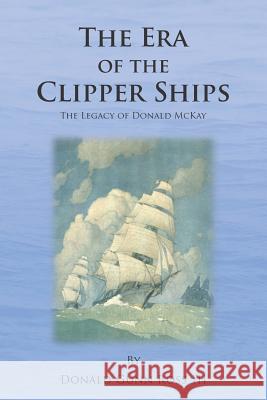The Era of the Clipper Ships: The Legacy of Donald McKay » książka
The Era of the Clipper Ships: The Legacy of Donald McKay
ISBN-13: 9781470155605 / Angielski / Miękka / 2012 / 644 str.
This story begins with the arrival aboard a lumber schooner of young Donald McKay at South Street Seaport in the spring of 1826. A short history of the New York shipyards sets the stage for the beginnings of the golden age of sail and the indentureship of Donald McKay at the shipyard of Issac Webb, the "Father of shipbuilders." These were exciting times for the ever increasing demand for fast sailing ships spurred on by the demand for tea from China and the lust for California gold. The struggle for the world's carrying trade was picking up in intensity, and the search for answers that the American merchant marine so desperately sought came down to this: How to reshape the most convenient and capacious cargo box into a solid of least resistance-and how, at the same time, to translate the unpredictable energies of wind into the swiftest forward motion. - Alexander Laing The book follows the career of Donald McKay, along with fellow shipbuilders of the era, such as John Willis Griffiths, Samuel Harte Pook, William Webb and others. I have drawn from a wide number of sources see Bibliography] as I try and catch a glimpse, here and there, of the lively cast of characters, seaports, merchants, captains, and shipbuilders, and of various sailing ships, many of them packets, leading to the clippers throughout the era. All the while trying to follow a general timeline keeping track of several score, the very crest of the clipper wave, and the fastest of the fleet as they raced around Cape Horn and the world with their precious cargoes. Every ship had a tale to tell, such as Houqua, Rainbow, and Sea Witch. Then there were the merchants, the Lows, Aspinwalls, Enoch Train, George Francis Train, James Baines, and others. Shipbuilding in New England is covered, too. Donald McKay built the fastest clipper ships that ever sailed the seas. Clippers built by Samuel Harte Pook and others captured fame as well. Courageous captains also had many tales to tell, such as Robert Waterman, Nathaniel Brown Palmer, Lauchlan McKay, Charles Porter Low, and others. The early days of the China tea trade after the American Revolution is captured here brought on by Chinese demand for sea otter pelts. The pages also tell the story of early San Francisco and the California gold rush. The peak of the clipper frenzy was reached in 1852 with the Deep Sea Derby around Cape Horn with such notable clippers as Wild Pigeon, Tinqua, Flying Dutchman, Flying Fish, and Game Cock. Donald McKay sold many clipper ships to ship owner James Baines of the Black Ball Line in Liverpool, England. Lightning, Champion of the Seas, James Baines, Donald McKay, and others. They all come to life on these pages. As does the sad demise of the clipper fleet hastened on by falling freight prices, steam power, and the Civil War. Donald McKay continued to build clipper ships long after all the other shipbuilders. The story of the Glory of the Seas is here and the later years of Donald McKay. There is an appendix chapter about Sergeant Donald McKay and the 76th Regiment of Macdonald Highlanders, and Shelburne, Nova Scotia. It is now time to join Donald McKay aboard the lumber schooner and begin your voyage through the era of the clipper ships. Welcome aboard.
Zawartość książki może nie spełniać oczekiwań – reklamacje nie obejmują treści, która mogła nie być redakcyjnie ani merytorycznie opracowana.











